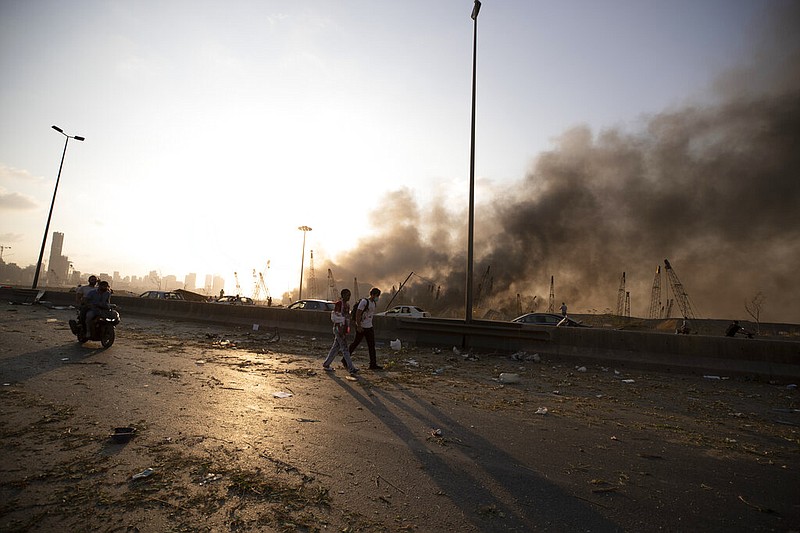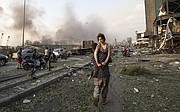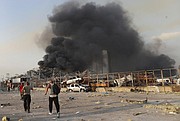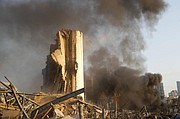BEIRUT -- Two deadly explosions shook Beirut on Tuesday, the second one with enough force to break windows over a radius of miles, damaging and shaking buildings, wounding thousands of people and strewing debris over a wide area.
More than 70 people were killed and 3,000 injured, with bodies still buried in the rubble Tuesday, officials said. The death toll is likely to grow higher.
[Video not showing up above? Click here to watch » https://www.youtube.com/watch?v=nGilb69z1yU]
Videos showed a shock wave from the second explosion. It knocked people down and enveloped much of the center city in a cloud of dust and smoke. Cars were overturned, and streets were blocked by debris, forcing many injured people to walk to hospitals.
The second blast struck with the force of a 3.5-magnitude earthquake, according to Germany's geosciences center GFZ, and it was heard and felt as far away as Cyprus more than 180 miles across the Mediterranean.
Flames continued to rise from the rubble well after the explosions.
Videos of the aftermath posted online showed people bleeding amid the dust and rubble, and damage where flying debris had punched holes in walls and furniture. On social media, people reported damage to homes and cars far from the port area where the blast occurred.
The Lebanese Red Cross said every available ambulance from north Lebanon, Bekaa and south Lebanon was being dispatched to Beirut to help patients. Hospitals, including the American University Hospital, were so overwhelmed that they were turning wounded people away. Patients were transported to hospitals outside Beirut because hospitals in the city were at capacity.
In the early hours today, Red Cross workers were still scouring the wrecked and deserted streets in neighborhoods adjoining the port, calling out to residents who might be trapped and injured to identify themselves.
The disaster may have started with a fire at a warehouse, state-run media said.
Abbas Ibrahim, chief of Lebanese General Security, said it might have been caused by highly explosive material that was confiscated from a ship some time ago and stored at the port. President Michel Aoun confirmed that statement.
Interior Minister Mohammed Fahmi told a local TV station that it appeared the blast was caused by the detonation of more than 2,700 tons of ammonium nitrate that had been stored in a warehouse at the dock ever since it was confiscated from a cargo ship in 2014. Witnesses reported seeing a strange orange-colored cloud like that that appears when toxic nitrogen dioxide gas is released after an explosion involving nitrates.
Ibrahim did not say what those materials were, but he warned against getting "ahead of the investigation" and speculating about a terrorist act.
Prime Minister Hassan Diab said in a televised statement, "Facts on this dangerous depot, which has existed since 2014 or the past six years, will be announced."
"What happened today will not come to pass without accountability," Diab said. "Those responsible will pay a price for this catastrophe." he said. "This is a promise to the martyrs and wounded people. This is a national commitment."
President Donald Trump said U.S. military generals have told him that they think the explosion was likely a bomb.
"I've met with some of our great generals and they just seem to feel that this was not some kind of manufacturing explosion type of an event. ... They seem to think it was an attack. It was a bomb of some kind."
Trump offered condolences to the victims and said the United States stood ready to assist Lebanon. "It looks like a terrible attack," he said.
Diab announced that today would be a national day of mourning. The Lebanese presidency said on Twitter that Aoun had instructed the military to aid in the response and called an emergency meeting of the Supreme Defense Council on Tuesday evening, which declared Beirut a disaster area.
WAREHOUSE REPORTS
There were local reports that the warehouse contained fireworks, and in several videos posted online, colored flashes could be seen in the dark smoke rising from the fire, just before the second explosion.
The governor of Beirut, Marwan Abboud, speaking on television, could not say what had caused the explosion. Breaking into tears, he called it a national catastrophe.
The secretary-general of the Kataeb political party was killed in the blast, and among those injured was Kamal Haye, the chairman of the state-owned electricity company, who was in critical condition, the news agency reported.
Hassan announced that his ministry would cover the costs of treating the wounded at hospitals, the National News Agency reported. It said the decision covered hospitals that have contracts with the ministry as well as those that don't.
St. George Hospital in central Beirut, one of the city's biggest, was so severely damaged that it had to shut down and send patients elsewhere. Dozens of patients and visitors were wounded by falling debris and flying glass.
"Every floor of the hospital is damaged," said Dr. Peter Noun, the chief of pediatric hematology and oncology. "I didn't see this even during the war. It's a catastrophe."
Inside the hospital, about six-tenths of a mile from the explosion, "everything just fell down, the windows destroyed, the ceiling in pieces," he said. Several of his patients -- children with cancer -- and their family members were among the injured.
He said the parents of four children being treated for cancer were so panicked that they grabbed their children, pulled out their intravenous needles and bundled them into their cars, headed to other hospitals or even went home.
A voice recording from Dr. Joseph Haddad of St. George Hospital was shared with other doctors across Lebanon, who forwarded it to The New York Times. In a follow-up phone call Haddad, head of emergency care at the hospital, confirmed the recording's authenticity.
"My friends, my friends. This is Joseph Haddad calling you from St. George Hospital. There is no St. George Hospital anymore. It's fallen, it's on the floor," Haddad says, as broken glass is heard crackling underfoot. "It's all destroyed. All of it. Pray to God, pray to God."
BLAST SCENE
The explosions were in Beirut's northern, industrial waterfront, little more than a mile from the Grand Serail palace, where Lebanon's prime minister is based. Many landmarks, including hospitals, mosques, churches and universities are nearby.
They went off next to a tall building called Beirut Port Silos, at or near a structure identified on maps as a warehouse. Videos showed only twisted metal and chunks of concrete where that warehouse had been, some of it identifiable as the remains of trucks and shipping containers.
When the explosion occurred, meetings were in full swing less than a mile away, at the hillside headquarters of the Kataeb Party, a Christian political group that was once one of Lebanon's most powerful.
The blast shook the building so badly that party members thought a bomb had gone off inside. As they collected their nerves and their belongings, they saw that the party's general secretary, Nazar Najarian, had been wounded by falling debris. Najarian, known by the nickname Nazo, died of his injuries.
"He had been through explosions, assassination attempts, wars with the Palestinians and Syrians, Nazo saw it all," said Elias Hankach, a Kataeb parliamentarian. "Our headquarters looks like a bomb went off inside. The inside is a mess, it's madness."
He said the party was waiting for clarity on whether the blast was an attack, the kind of crude tool used for decades to shape Lebanon's political landscape, or an accident resulting from mismanagement.
If it turns out to be accidental, he said, then the disaster is not particularly surprising, the product of "cumulative nonchalance at all levels."
EXPLOSIONS OF PAST
The severity of the explosions recalled the days when bombings and mayhem were a regular fact of life in Beirut, both during its 1975-90 civil war and its aftermath, including sporadic conflicts between Israel and Hezbollah.
Among the worst were in 1983, when a suicide attack on the U.S. Embassy killed 63 people in April, and a bombing in October on the headquarters of international peacekeepers killed 241 U.S. Marines and 58 French troops. The attack on the Marines, the worst loss for them since the invasion of Iwo Jima in World War II, was blamed by American officials on Hezbollah, which the United States, Israel and a number of other countries consider a terrorist organization.
But if the latest explosions Tuesday were intentional, they would shatter a prolonged stretch of relative calm in the Lebanese capital. An Israeli intelligence official denied any Israeli involvement in the incident.
One of Israel's top bomb experts, Boaz Hayoun, said fireworks could have been a factor setting off the bigger blast. "Before the big explosion, ... in the center of the fire, you can see sparks, you can hear sounds like popcorn and you can hear whistles," said Hayoun, owner of the Tamar Group, which works closely with the Israeli government on safety and certification issues involving explosives. "This is very specific behavior of fireworks."
Israeli Defense Minister Benny Gantz and Foreign Minister Gabi Ashkenazi offered the Lebanese government medical and humanitarian aid, as well as immediate emergency assistance through international intermediaries because Israel and Lebanon are in a state of war and have no contact.
Less than a week ago, Israel said it had thwarted a raid by a "terrorist squad" from Hezbollah, the Shiite group that is part of Lebanon's government, in a disputed border area.
Israeli military officials said there was an exchange of gunfire, which Hezbollah denied.
Israeli military officials say Hezbollah has planted many rockets in southern Lebanon that could threaten northern Israel.
But in recent years, the longtime enemies have sought to avoid another war. Hezbollah has refrained from killing Israelis while Israel has largely avoided killing Hezbollah fighters in Syria, where they are fighting on the Syrian government's side. Both Israel and Hezbollah have sought to avoid a war that could devastate Lebanon and Israel.
[Gallery not loading above? Click here for more photos » arkansasonline.com/85explosion/]
'DEEPEST CONDOLENCES'
State Mike Pompeo extended his "deepest condolences" to the people of Beirut and said the United States is closely monitoring the situation. "Our team in Beirut has reported to me the extensive damage to a city and a people that I hold dear, an additional challenge in a time of already deep crisis," Pompeo said in a written statement.
French President Emmanuel Macron said in a tweet that his country was sending aid. Israel offered emergency assistance through international intermediaries, its Foreign Ministry said in a statement. Iran, Hezbollah's patron, also said it was ready to help. "Stay strong, Lebanon," its foreign minister, Javad Zarif, said in a tweet.
Germany's foreign ministry tweeted that German Embassy employees were among those injured. Phone lines went down, and the Internet faltered as friends and relatives took to the telephone to check on loved ones.
Information for this article was contributed by Ben Hubbard of The New York Times; by Bassem Mroue, Darlene Superville, Sarah El Deeb, Josef Federman, Jon Gambrell and Deb Riechmann of The Associated Press; and by Liz Sly, Sarah Dadouch and Louisa Loveluck of The Washington Post.



